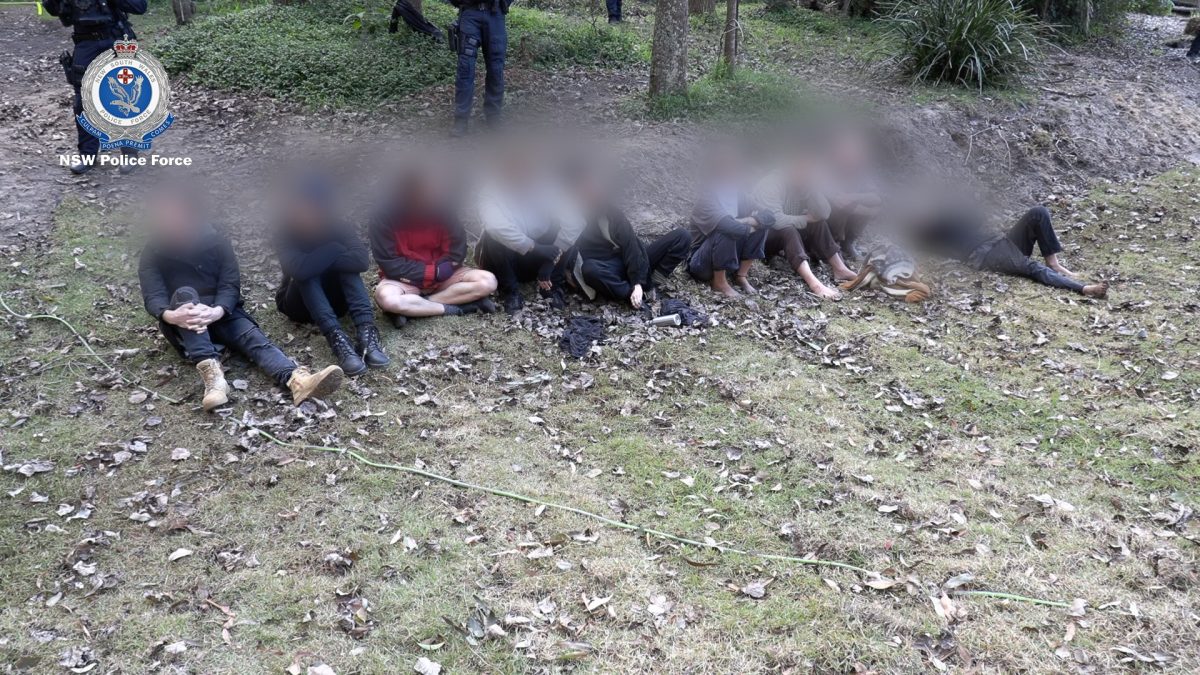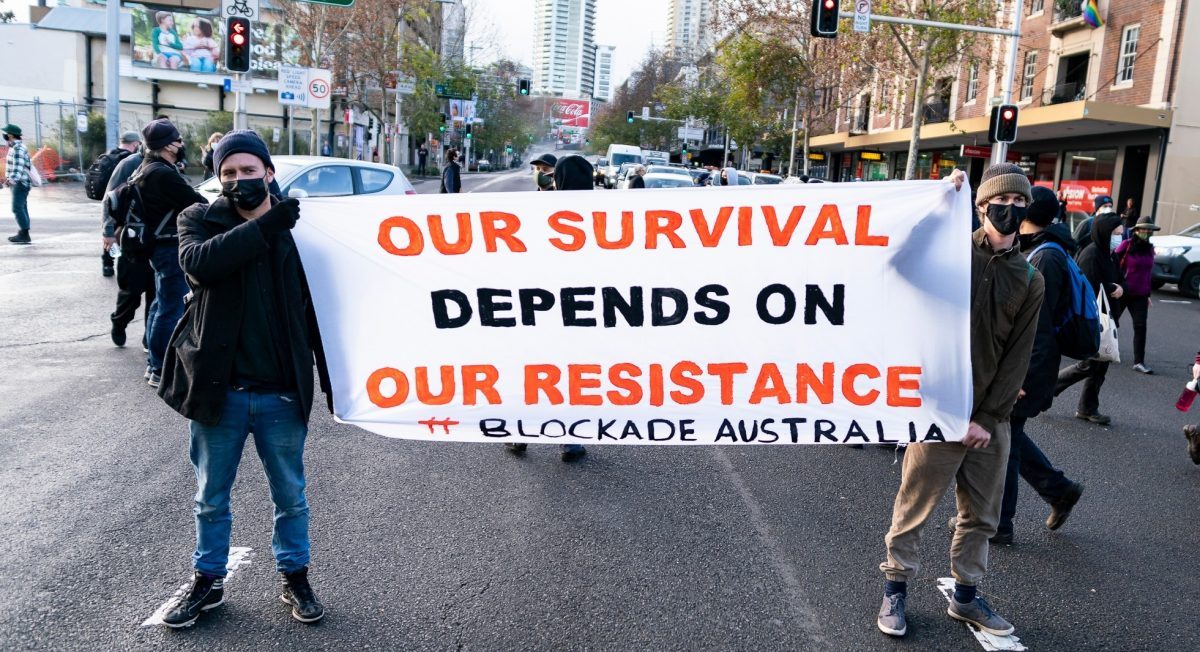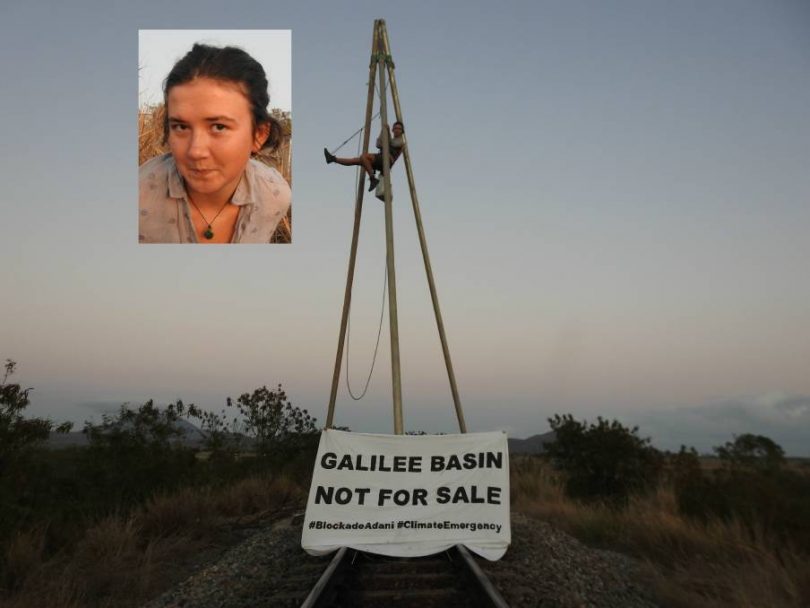
Hannah Doole (left) in action at the Newcastle coal port in late 2021. Photo: Hannah Doole.
When police raided a camp of climate change protesters north of the Blue Mountains last month, among those arrested was a young woman from the Far South Coast who has blasted the authorities’ alleged heavy-handed response and described the targeting of her group as “alarming”.
At the time, NSW Police said officers had been conducting planned investigations at Colo early in the morning of 19 June when they were approached by a group of people and surrounded and the tyres of an unmarked police vehicle were damaged, making it unable to be driven.
More police resources were called in, including the riot squad, raptor squad and PolAir and they arrested multiple people, searched the area and seized several items.
But according to the protesters, the incident was not that straightforward.
Hannah Doole, a 22-year-old from Bega with the group, said before the raid started two people dressed in camo gear were spotted hiding in the bush near the camp.
When protesters went to check on them she claimed the pair didn’t say anything apart from “we’ve been compromised”, then walked down the hill towards the rest of the campers and a driveway.
“It was pretty confusing and intimidating,” she said.
She said when an unmarked car arrived, protesters stood between it and the people in camo because the pair hadn’t identified themselves and the protesters were concerned photos had been taken of the camp without their consent.

Officers from Strike Force Guard were carrying out a planned investigation at a Colo property when the arrests were made. Photos: NSW Police.
Ms Doole alleged the car rammed into protesters before coming to a stop and after that she walked away as she did not want to be around whatever was happening.
Up on a hill, she said she could hear sirens getting closer, spotted a police helicopter swooping in and saw that “car after car arrived with cops”.
She said she was arrested on the hill and her charges changed several times before they finally settled on counts like assaulting and intimidating police.
“My take of what happened is they were doing intel gathering and it went wrong,” she said.
“They are trumped-up charges that were designed to derail the upcoming protests. It’s definitely a political response.”

Climate action group Blockade Australia said it was behind the recent protests in Sydney. Photo: Blockade Australia Facebook.
In late June Blockade Australia, a network focusing on climate action, had been disrupting roads in the Sydney CBD during peak hour to bring home the point that Australia was driving climate collapse. More arrests were made during these protests.
Ms Doole alleged police have been leading a targeted operation against Blockade Australia saying “the extent to which they’ve come after us is alarming”.
“I think police have always been violent and oppressive towards effective protests; that’s a big part of the role that police serve,” she said.
“I think that’s often hidden and it’s become more exposed in the past little while.”
Ms Doole is no stranger to joining the frontline in the fight for greater climate action.
In 2018 she spent eight hours suspended over a train line on a tripod in Queensland in a bid to hold up the progress of the Adani mine. The following year she was one of 72 climate protestors arrested in Brisbane.
However, she has not been part of the more recent Sydney protests due to her bail conditions.

Hannah Doole spent eight hours suspended over a train line on a tripod near the town of Bowen protesting against the Adani Mine. Photo: Supplied.
“I think the most important thing at this stage is for more people to join climate protests because climate protesters are in a really vulnerable position when the state is coming to smash them, as they have been,” she said.
“Talking to people about the need for climate action is a strong focus for now.
“A protest is only effective when it’s disruptive.”
Ms Doole intends to plead not guilty to her charges and will be in Penrith Local Court to face them later in July.
Before the protests in Sydney took place, Minister for Police Paul Toole said those who engaged in unauthorised protests had no regard for their fellow citizens.
“This isn’t peaceful protesting; these are people pulling stunts that put lives at risk and stop people trying to get work and get their kids to school and police simply won’t tolerate it,” Mr Toole said.
“Under the recently-strengthened laws we have seen protestors receive heavy fines, jail terms and some even being deported.”








